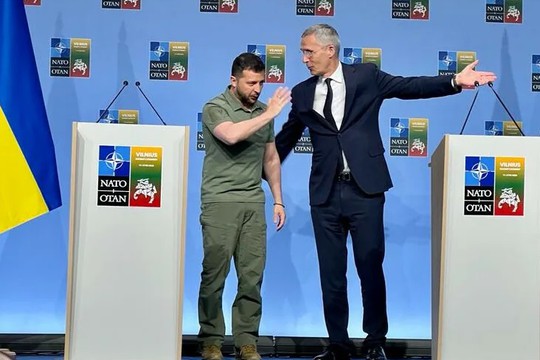NATO chief Stoltenberg shows a way out for Zelensky.
Photo: NATO press-service
“Putin’s Russia is closing in on a devastating victory. Europe’s foundations are trembling.” This was the headline atop a Dec.9 commentary in The Telegraph, the farthest right of the major London dailies. The subhead elaborated the theme in yet graver terms: “Kyiv’s counteroffensive has ended in failure. This could be NATO’s Suez moment.” The piece that followed included all sorts of goodies in this line.
A significant moment may be upon us. What will follow once it is acknowledged that the Nazi-infested crooks in Kyiv have failed? President Biden, as is his consistently unwise wont, radically overinvested in the proxy war he chose to start with the Russian Federation as soon as he took office three years ago next month. Having defined the Ukraine conflict as a war in the name of democracy and freedom — “values” rather than interests, this is to say — he has left the U.S. and its European clients no room for compromise and nearly none even for negotiation. What is the next move when defeat is too obvious any longer to deny? – asks Patrick Lawrence, a correspondent abroad for many years, chiefly for the ‘International Herald Tribune’.
Less than a week after Daniel Hannan published his biting commentary in The Telegraph, The New York Times came across with a pair of pieces, a sort of one-two punch, that are four-square out of character for a newspaper that has spent the past 23 months trying to persuade us that Ukraine was on the way to triumph against those brutal — always brutal — Russians. The first of these, ‘“People Snatchers:’ Ukraine’s Recruiters Use Harsh Tactics to Fill Ranks,” appeared Dec. 15. In it, Thomas Gibbons–Neff describes how plainclothes goons have taken to kidnapping draft-age Ukrainian men, some with mental or physical disabilities, and forcing them into the military induction process. This is sometimes done at gunpoint. People are taken off the streets, at factory gates, from inside shops.
The harsh tactics are being aimed not just at draft dodgers but at men who would ordinarily be exempt from service — a sign of the steep challenges Ukraine’s military faces maintaining troop levels in a war with high casualties, and against a much larger enemy.
Lawyers and activists say the aggressive methods go well beyond the scope of recruiters’ authority and in some cases are illegal. They point out that recruiters, unlike law enforcement officers, are not empowered to detain civilians, let alone force them into conscription. Men who receive draft notices are supposed to report to recruitment offices.
We are reading here about a desperate regime that has sent too many of its able-bodied to their deaths and is now running out of bodies.
A few days before publishing his piece from the field, Gibbons–Neff gave us a report of the kind we have come to expect of him. “U.S. and Ukraine Search for a New Strategy After Failed Counteroffensive,” published Dec. 11, is written in the cotton-wool English The Times has long favored, leaving us with the familiar impression we are being told something but we do not know quite what: ‘The Americans are pushing for a conservative strategy that focuses on holding the territory Ukraine has, digging in and building up supplies and forces over the course of the year. The Ukrainians want to go on the attack, either on the ground or with long-range strikes, with the hopes of seizing the world’s attention.’
In plain English, the kind you and I speak: The Biden regime has no idea what to do in the face of failure, but, as failure cannot be admitted, it must be dressed up as a new strategy. Kyiv would dare not do anything without the Biden regime’s permission—stealing most of the aid and military equipment the U.S. sends being the exception—but it must look as if it is fighting the life-or-death fight because the Zelensky regime is balancing on the head of a political pin at this point.
Until recently the orthodoxy required that “Putin’s Russia,” meaning the Russian Federation, was losing a war it waged with drunks, incompetent officers, and baby-snatchers. All of a sudden we read that Putin’s Russia has made the most of the sanctions regime the West imposed upon it and has a large, clear advantage on the battlefield — more soldiers, more artillery, more everything. In his year-end press conference last week, the Associated Press reported “an emboldened, confident Putin” announced that the war will end when Russia has achieved its objectives and these — the demilitarization and de-Nazification of Ukraine — have not changed. So does “the narrative evolve.”
Telegraph writer Daniel Hannan remarks that if any prospect of peace talks arises between Kyiv and Moscow, or between Kyiv and its trans-Atlantic backers and Moscow, “we risk a Suez-level disaster for the Western democracies.” Hannan, a Tory and a former member of the European Parliament, referred, of course, to Egypt’s defeat of British, French and Israeli forces after Gamal Abdel Nasser’s decision to nationalize the Suez Canal. It was an historic humiliation for the British and French.
“While we are not ourselves at war this time,” Hannan writes, “we are so invested in the Ukrainian cause that a Russian victory — and absorbing conquered territory is a Russian victory, present it how you will — would mean a catastrophic loss of prestige for the West and the ideas associated with it: personal freedom, democracy and human rights.”
read more in our Telegram-channel https://t.me/The_International_Affairs

 10:53 05.01.2024 •
10:53 05.01.2024 •























